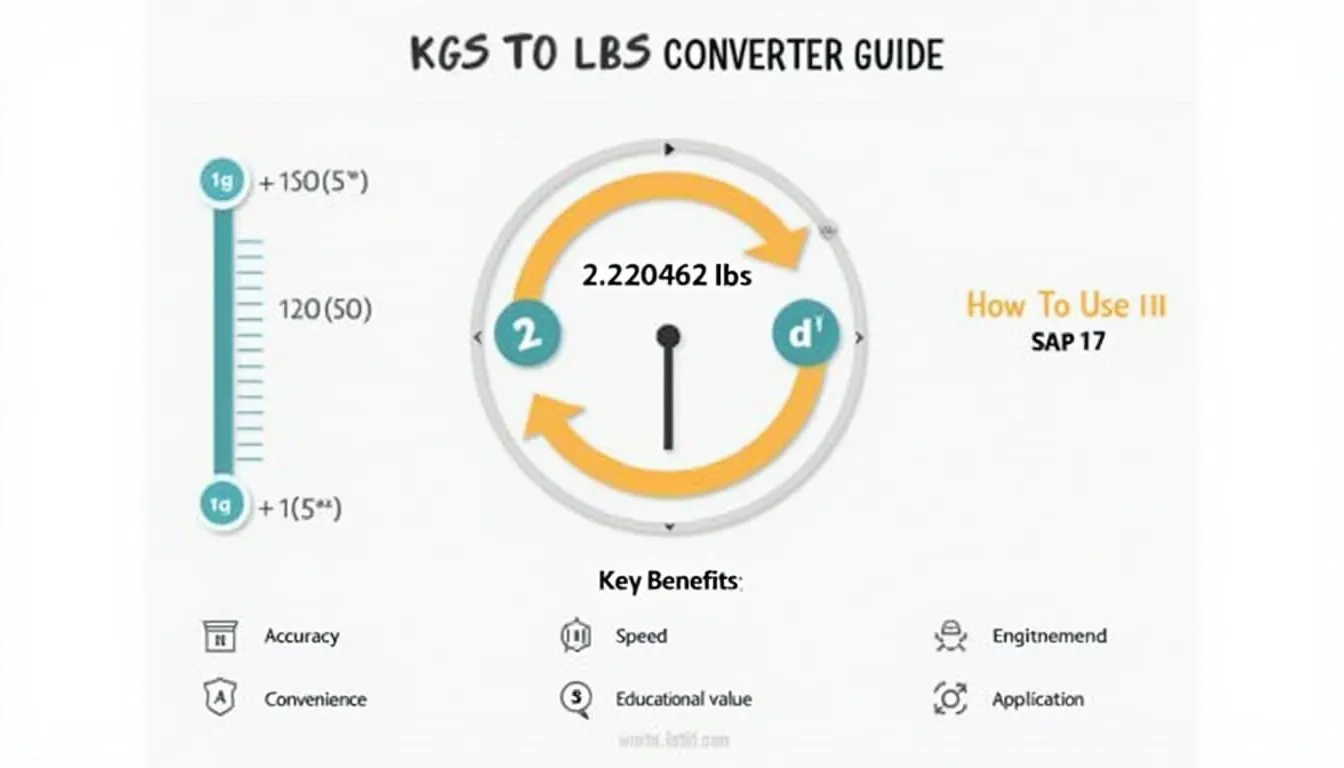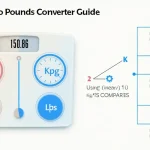Kg to Lbs Converter
Is this tool helpful?
How to use the tool
- 1. Type a mass: Click the “Mass in kilograms” field and enter 2.3 kg or 15.8 kg as practice inputs.
- 2. Check the value: Confirm the number is positive and within your required range (0.01 – 10 000 kg).
- 3. Convert: Press Enter or click “Convert.” The result appears instantly below the form.
- 4. Read the output: The converter shows kilograms and their pound equivalent with two-decimal precision.
- 5. Repeat as needed: Edit the number to trigger new calculations automatically.
Formula applied
The JavaScript routine multiplies every kilogram entry by the exact factor:
$$\text{lb} = \text{kg} \times 2.20462262185$$
Example calculations
- 2.30 kg → 2.30 × 2.20462262185 = 5.07 lb
- 15.80 kg → 15.80 × 2.20462262185 = 34.83 lb
Quick Facts
- Exact factor: 1 kg = 2.20462262185 lb (NIST, 2019).
- Display precision: results round to 0.01 lb, complying with ISO 80000-1 numeric format (ISO, 2019).
- Practical range: 0.01-10 000 kg covers grocery to freight scales (Mozilla MDN, 2023).
- Typical airline bag limit: 23 kg ≈ 50.71 lb (IATA Baggage Guide, 2023).
FAQ
What is the exact kilogram-to-pound factor?
The international conversion factor is 2.20462262185 lb per kilogram (NIST, 2019).
How accurate is this calculator?
It performs floating-point math in JavaScript and keeps full precision before rounding the display, ensuring <14-digit accuracy (Mozilla MDN, 2023).
Can I convert very large industrial loads?
Yes. Values up to 10 000 kg—roughly a 20-ft container’s payload—remain within safe 64-bit float range (ISO Container Handbook, 2022).
Does the tool work offline?
Once the page loads, the JavaScript runs locally, so conversions continue without internet access.
How do I reverse the conversion?
Divide pounds by 2.20462262185, or multiply by 0.45359237 kg/lb (BIPM, 2019).
Why do airlines list baggage limits in kilograms?
Most civil aviation authorities adopt metric units for standardisation across international carriers (ICAO Annex 5, 2020).
Is a pound a unit of mass or force?
In everyday U.S. usage, “pound” means avoirdupois pound mass; engineering contexts clarify pound-force (NIST Handbook 44, 2022).
Can I embed this converter on my site?
Yes. Copy the HTML and script blocks; no external libraries are required.
Important Disclaimer
The calculations, results, and content provided by our tools are not guaranteed to be accurate, complete, or reliable. Users are responsible for verifying and interpreting the results. Our content and tools may contain errors, biases, or inconsistencies. Do not enter personal data, sensitive information, or personally identifiable information in our web forms or tools. Such data entry violates our terms of service and may result in unauthorized disclosure to third parties. We reserve the right to save inputs and outputs from our tools for the purposes of error debugging, bias identification, and performance improvement. External companies providing AI models used in our tools may also save and process data in accordance with their own policies. By using our tools, you consent to this data collection and processing. We reserve the right to limit the usage of our tools based on current usability factors.







